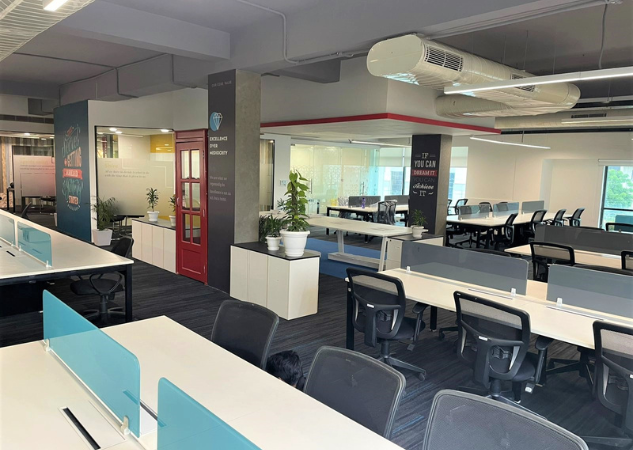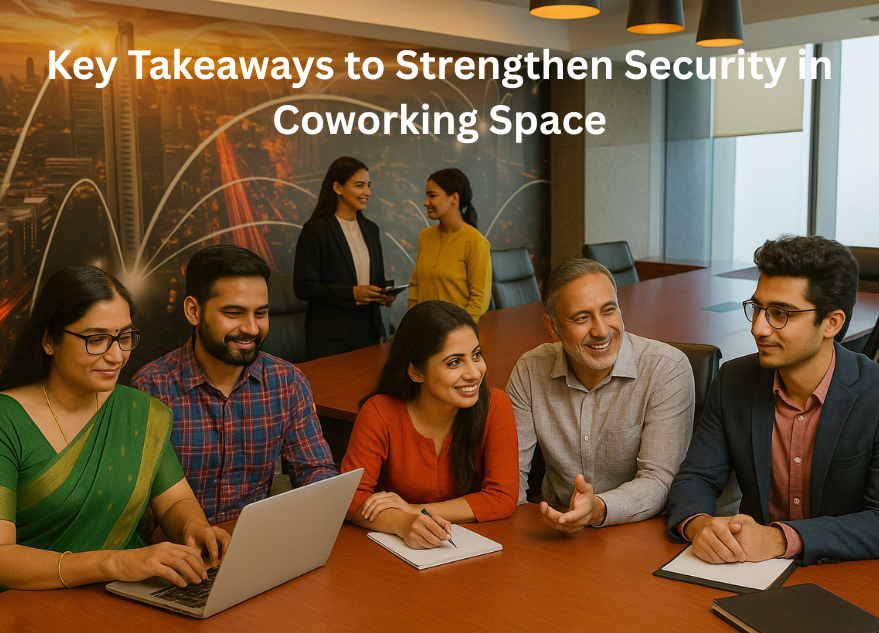Coworking spaces are thriving hubs for freelancers and remote teams. But to stay safe, strong security, smart planning, and clear protocols are a must.
💡 Are you looking for Coworking space in Gurgaon, Noida or Delhi? We are just a call away. Call Now: 08999 828282
10 Practical Ways to Improve Office Security and Ensure Workspace Safety
- Invest in Smart Security Systems
- Implement Access Control Policies
- Regularly Train Staff and Members on Security Protocols
- Design the Space with Visibility in Mind
- Appoint a Responsible Community Manager
- Secure Network and IT Infrastructure
- Monitor and Log All Visitors
- Maintain Emergency Preparedness
- Use Alarm Systems and Panic Buttons
- Regularly Review and Upgrade Security Measures
1. Invest in Smart Security Systems
Modern security systems like CCTV, biometric access, and motion sensors are essential. They offer 24/7 surveillance and reduce unauthorized access. Smart systems can also send real-time alerts to admins and track visitor logs. Whether your coworking space is small or large, a scalable security setup ensures peace of mind. These tools are easy to manage and support efficient coworking management. Prioritizing tech-based solutions increases safety without compromising user convenience.

2. Implement Access Control Policies
Limiting who can enter different parts of the workspace strengthens office security. Use keycards, mobile access, or facial recognition systems to control access to zones like private cabins or server rooms. Clear check-in and check-out policies help monitor everyone entering the premises. This ensures only authorized members use the facilities, improving workspace safety and reducing internal threats.
3. Regularly Train Staff and Members on Security Protocols
Security isn’t only about devices; it’s also about awareness. Conduct workshops for staff and members on basic security rules like not sharing passwords or leaving laptops unattended. Make safety a community value. Your coworking management team and community manager should lead these efforts by making security guidelines visible and easy to follow.
Also Read: The Role of Coworking in Supporting Small Businesses
4. Design the Space with Visibility in Mind
Layout matters. Design your coworking space to maximize visibility—no blind corners, proper lighting, and open communal areas. This helps prevent suspicious activity. Cameras should cover all entrances, exits, and common areas. A transparent workspace layout promotes workspace safety and encourages respectful behavior among members.
5. Appoint a Responsible Community Manager
A community manager plays a vital role in maintaining safety. Their responsibilities include managing guest access, conducting orientation for new members, and being the first point of contact during emergencies. They monitor behavior, enforce policies, and build a secure atmosphere. The community manager ensures that both rules and relationships are balanced for the benefit of the entire workspace.
6. Secure Network and IT Infrastructure
Cybersecurity is equally important. Use firewalls, antivirus software, and encrypted Wi-Fi networks. Provide members with unique login credentials and restrict access to sensitive data. Educate users on phishing and data theft. Strong IT security systems protect both the workspace and its users from digital threats, boosting confidence in your coworking space security.
7. Monitor and Log All Visitors
Visitor management is a crucial part of office security. Use digital logbooks or visitor management systems to track entries and exits. Require ID verification and issue temporary access cards. This keeps your community safe from potential external risks and makes it easy to trace incidents if needed.
8. Maintain Emergency Preparedness
Accidents and emergencies happen. Make sure your coworking space is equipped with fire extinguishers, first aid kits, and emergency exits. Conduct drills and have an evacuation plan displayed clearly. Staff and members should know what to do in case of a fire, earthquake, or health emergency. Preparedness directly supports workspace safety and reduces panic during real situations.
💡 Are you looking for Coworking space in Gurgaon, Noida or Delhi? We are just a call away. Call Now: 08999 828282
9. Use Alarm Systems and Panic Buttons
Install silent alarm systems and panic buttons in strategic areas, especially in reception and private cabins. These tools allow staff or members to raise alerts discreetly during emergencies. Integrating such tools with your overall security systems strengthens the safety net for everyone inside the building.
10. Regularly Review and Upgrade Security Measures
Technology evolves, and so do threats. Regularly audit your office security systems, update software, and replace outdated hardware. Seek feedback from members and staff to identify gaps. Adapting your coworking management approach helps you stay ahead of potential risks and ensures consistent coworking space security.
Running a successful coworking space is more than just offering desks and Wi-Fi. Strong security systems, a dedicated community manager, and clear protocols create a safe, productive environment. By investing in both physical and digital safety, you not only protect your space but also earn the trust of your members. Remember, workspace safety is the foundation of a thriving coworking community.
At The Office Pass (TOP), we prioritise your safety so you can focus on growing your business without worry. Looking for a secure, flexible workspace? Contact The Office Pass (TOP) today at 8999-828282 and experience coworking made safer and smarter!
Frequently Asked Questions (FAQs)
Question: Why is security important in coworking spaces?
Answer: Security protects the people, assets, and data within the coworking environment. With multiple businesses sharing the same space, strong office security ensures that everyone feels safe and confident.
Question: What is the role of a community manager in workspace safety?
Answer: A community manager oversees day-to-day operations, ensures security protocols are followed, and handles emergencies. They are essential in creating a secure and friendly workspace culture.
Question: How do access control systems help coworking spaces?
Answer: Access control systems restrict unauthorized entries and allow only approved individuals into specific areas. They add a layer of coworking space security and help track member activity.
Question: Can coworking spaces ensure cybersecurity for members?
Answer: Yes. By using firewalls, encrypted Wi-Fi, and secure login processes, coworking spaces can offer a safe online environment for members, protecting them from cyberattacks.
Question: What should a visitor management system include?
Answer: It should record names, time of entry/exit, contact details, and purpose of visit. Digital systems also provide ID verification and photo capture for enhanced office security.
Question: How often should security systems be reviewed?
Answer: At least once every 6 months. Frequent reviews help identify vulnerabilities and keep your security systems updated with the latest technology.
Question: Are CCTV cameras necessary in all coworking spaces?
Answer: Yes, especially in common areas, entrances, and exits. CCTV helps deter theft, monitor activity, and can provide evidence if incidents occur.
Question: How can members contribute to coworking space security?
Answer: Members should follow safety guidelines, report suspicious behavior, avoid sharing access credentials, and be mindful of their belongings.
Question: What emergency tools should a coworking space have?
Answer:Fire extinguishers, first aid kits, emergency exits, evacuation maps, and panic buttons are essential to ensure workspace safety.
Question: What’s the first step to improving coworking security?
Answer: Start with a complete security audit. Assess current risks, install reliable security systems, train your team, and create clear safety guidelines.



